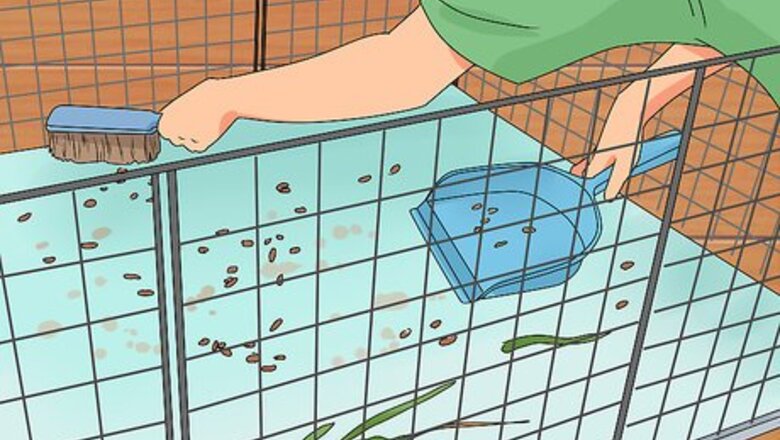
views
Maintaining a Clean Environment
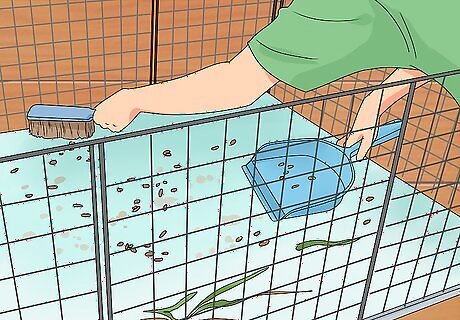
Clean your guinea pig's cage at least once every week. A complete cleaning involves discarding all of the used bedding, not merely "spot cleaning" the dirty spots. After removing the old bedding, wash the bottom and sides of the cage with soap and water, rinse thoroughly, then place fresh, new bedding in the cage. After washing with soap and water, you can use a 10% white vinegar and water solution (1 part vinegar to 9 parts water) as a rinse before drying the cage bottom. Using the vinegar solution once a week (each time you fully clean the cage) may help eliminate odors and remove buildup that water can't..
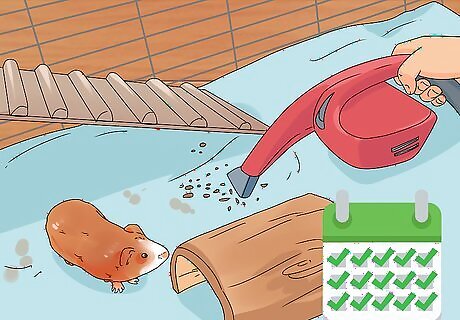
Spot-clean your guinea pig's cage daily. Particularly if you have multiple guinea pigs in one cage, you should clean out parts of the cage daily in addition to the once-a-week deep cleaning. To spot-clean, remove and discard any areas of soiled bedding at the end of the day. Most guinea pigs will use one part of their cage as a toilet area; cleaning the toilet area daily will help with odor and cleanliness.
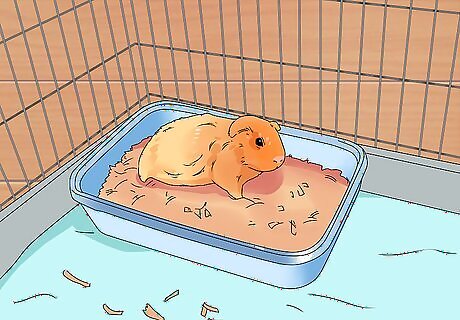
Litter-train your guinea pigs. Spot cleaning will become easier if you can train your guinea pigs to use a litter box. Identify the area that your guinea pigs tend to use as a toilet area. Then place a litter box made for small mammals in that corner of the cage. Your guinea pigs will be more likely to use the litter box if you put it near their hay. Guinea pigs usually have a "kitchen" area where they eat and poop a lot. However, don't expect them to always use it; guinea pigs can't be perfectly litter trained like cats. If they change the area in which they use the toilet, try moving the litter box to the new area. Clean out the litter box every 1-3 days depending on how much it is used. Never place clumping cat litter in a guinea pig's litter box. Guinea pig-safe bedding material is the most appropriate option.
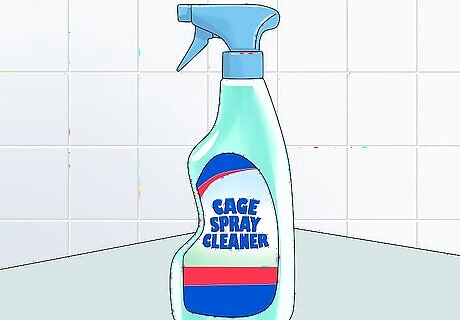
Use a cage cleaning spray. Cleaning sprays specifically formulated for small animal cages can help minimize cage odors. Check your local pet store for products that are safe and effective for guinea pigs. Make sure you use only as much as the label recommends. To use a cage-cleaning spray, remove all used bedding from the cage. Spray the tray of the cage liberally with the cage cleaner. Allow the cage cleaner to soak into the cage for 3-5 minutes. Use a rough towel to wipe away cage cleaner and loosened debris from the bottom of the cage. Allow the cage to dry completely (in the sun if possible), place fresh bedding in the bottom of the cage, and return your guinea pigs to their home. You may want to continue using soap and water to clean the cage in addition to the cage cleaner.
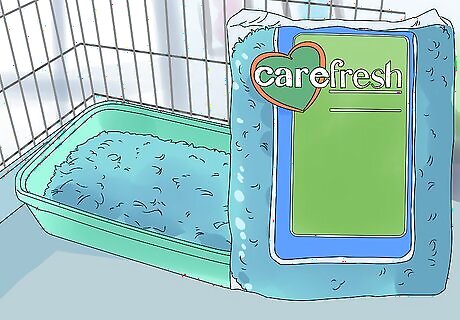
Use odor control bedding. Bedding formulated to block odors, such as Carefresh, can keep the cage smelling fresh longer. Place 1-3 inches of bedding in the bottom of your guinea pigs' cage. Be sure to scoop out wet or soiled bedding daily. Though odor-blocking bedding can make the guinea pigs’ cage smell better, you should still clean the cage well and completely replace the bedding at least once every week. Baking soda is marketed as odor-controlling, but it can cause irritation and should not be used.
Cleaning Your Guinea Pigs
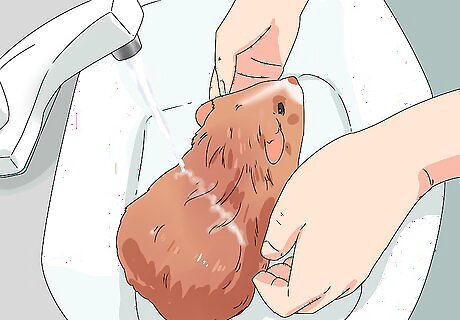
Bathe your guinea pigs only as needed to keep them clean. Most guinea pigs should be able to keep themselves clean, but some long-haired guinea pigs may need to be bathed more often. Bathing guinea pigs may increase their risks of becoming ill, as they become chilled easily. Minimize this risk by keeping guinea pigs in warm towels until their fur is completely dry. Attentive grooming and brushing can minimize your need to fully bathe your long-haired guinea pig. You can brush your guinea pig with a soft-bristled baby brush. You may also want to trim the hair around your long-haired guinea pig's bottom to minimize how dirty the hair gets while your guinea pig uses the toilet. If you feel that your guinea pig needs frequent baths, talk to your vet about weighing the risks of frequent bathing against the benefits of a cleaner guinea pig.
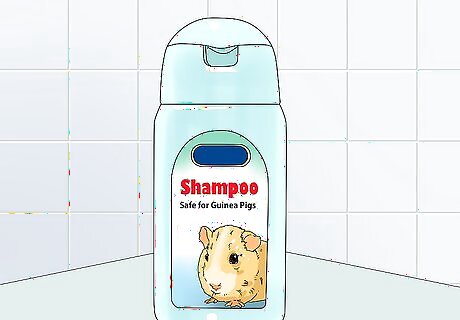
Use an appropriate shampoo. Be sure to only use a shampoo that is specifically labeled as safe for guinea pigs. Do not use human shampoo or dish detergent, as these are too harsh and can cause skin irritation. Some specific shampoos that are safe to use are Scentsations Premium Small Animal Shampoo and Posh ‘n Go Protein Shampoo.
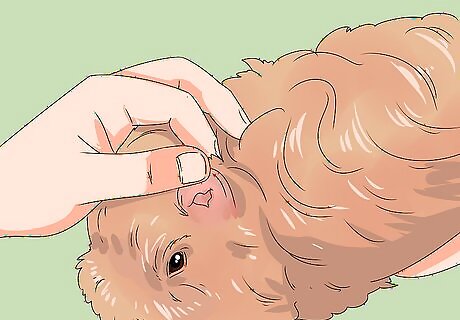
Check your guinea pig's ears. Guinea pigs produce a gray-colored earwax that should be mostly odor-free. If your guinea pig's ears smell bad or are red, schedule an exam with your veterinarian; they may have an ear infection.
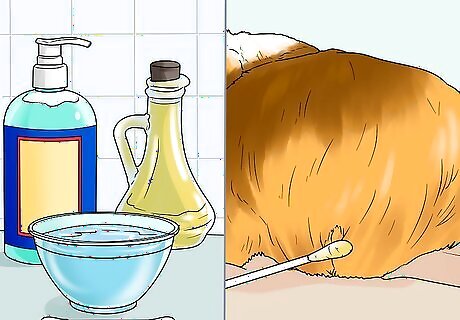
Clean your guinea pig's scent glands. Both male and female guinea pigs have a scent gland, however, female scent glands are generally less active. The scent gland is covered by fur and should be located where the tail is imagined to be, and above their genitals. Clean your guinea pig's scent gland once a month with a cotton swap, warm water, soap, and coconut oil.
General Care to Reduce Odors
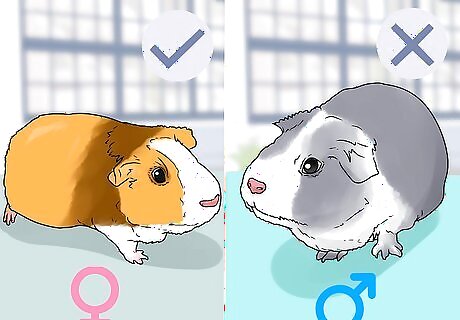
Adopt sows instead of boars. If you haven't already adopted your guinea pigs, choose female guinea pigs next time you visit an adoption centre or pet store. Female guinea pigs generally produce less smell and scent-mark less than male guinea pigs. Additionally, adopt your guinea pigs in pairs rather than adopting a whole herd. Fewer guinea pigs produce less smell and less mess.
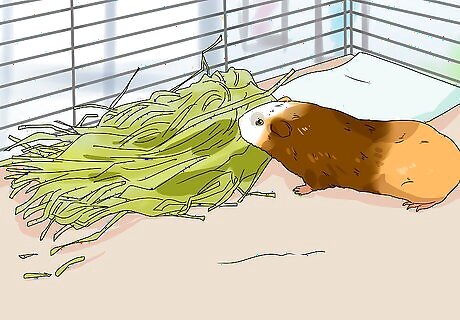
Provide your guinea pigs with fresh hay. Timothy, orchard, or meadow hay are a few examples of hay that guinea pigs can consume. Guinea pigs need hay to keep their teeth ground down and their digestive tracts in balance. Choose fresh hay based on its colour, scent, and texture. Most pet stores sell hay in bags. These are generally not fresh and have been sitting on the shelves for months. Old hay is tougher in consistency, yellow, and holds a musty scent. Fresh hay should be green-tinged, grassy, soft, and pliable. Adding mint, dandelion greens, parsley, or cilantro to the hay may help the cage smell fresh and will continue to provide your guinea pigs with a healthy diet. However, keep these greens to a minimum as they are high in calcium.
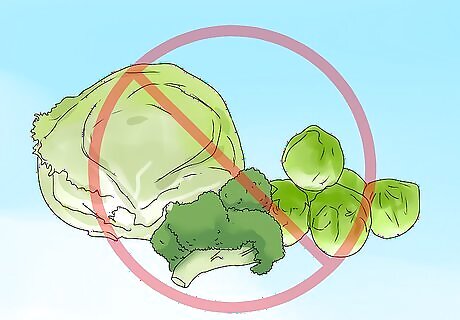
Avoid feeding your guinea pigs improper foods. Some foods give guinea pigs gas and upset their stomachs. Some specific foods to avoid include iceberg lettuce, broccoli, and Brussels sprouts. Some good snack substitutes to offer are bell peppers, cucumbers, and celery. Leafy greens like spinach and kale are also suitable options. Try to avoid them in large amounts due to their calcium content, though. For treats, try kiwi fruit, apple, strawberries, or safe store-bought treats (like pea flakes or Oxbow baked treats). Avoid citrus fruits as the acid can sometimes irritate your guinea pig's mouth.
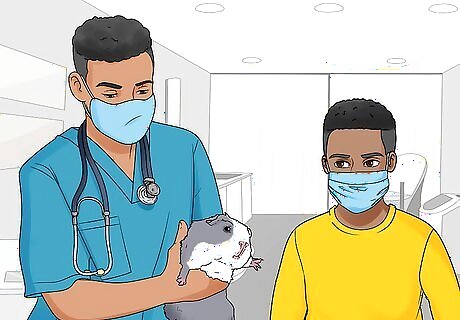
Have your guinea pigs checked by a vet. Foul-smelling odor is often a sign of urinary tract infection or liver failure. Otherwise, the strong-scented odor could also be a sign of dehydration. Organise a regular checkup with an exotic vet that specialises with guinea pigs to rule out any underlying health issues.




















Comments
0 comment